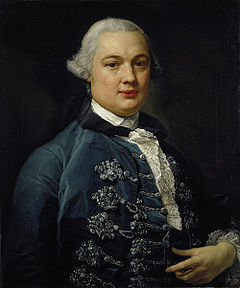Get Today in Masonic History into your Inbox. Sign up today for one of our email lists!
Need an article for your Trestleboard/Newsletter see our Use Policy
James Bruce is born

Today in Masonic History James Bruce is born in 1730.
James Bruce was a Scottish Travel writer and explorer.
Bruce was born in Kinnaird, Stirlingshire, Scotland on December 14th, 1730. He was educated at the Harrow School and Edinburgh University. Initially he began studying for the bar, around the same time he married the daughter of a wine importer and went into his new father-in-laws business. The marriage only lasted 9 months when his wife passed away.
After the passing of his wife, Bruce traveled around Europe, mostly to Portugal and Spain. After studying various manuscripts in Spain, he began learning Arabic and Ge'ez, a southern Semitic language primarily spoken in Ethiopia.
In 1762, when the war broke out with Spain, Bruce recommended an attack plan for Ferrol. The plan was not used, it did get Bruce noticed by important people in the British Government and he was sent to be the Consul for Algiers. In addition to his duties as Consul, he was directed to study the Roman ruins in the area. It wasn't until 1765, when Bruce's successor arrived he was finally able to study them. Bruce traveled extensively through the Barbary Coast, a term which referred to the lands of the Berber people which is made up of the modern countries, of Libya, Morocco, Algeria and Tunisia. He also traveled extensively in the Levant region, a term referring to the Muslim countries in the Eastern Mediterranean consisting of Syria, Palestine (before the formation of Israel), Turkey, Greece and Egypt.
In 1770, Bruce traveled to Ethiopia. He spent two years there studying the region and it's people. At the time the Ethiopian people and government was not fond of foreign visitors. Bruce was able to win over the people and their leaders, most likely, due to his ability to speak Ge'ez. During his time in Ethiopia he was searching for the source of the Blue Nile, one of the two major tributaries of the Nile river along with the White Nile.
Bruce claimed he was the first European to reach the source, this claim is disputed and most historians say a Jesuit missionary, Pedro Paez, was the first. Bruce claimed Paez's documentation about the area was forged and written after the fact. A Fr. Jeromino Lobo also claimed to have reached the source, Bruce sought to discredit him by claiming he had details of the area wrong. Regardless of whether Bruce was the first to the source or not, his two year study of Ethiopia and it's people are recognized as a real addition to the information of his day.
It took Bruce more than a year to return to London after he left Ethiopia. A variety of tragedies fell on him and his companions as they made their way back to London. This included being imprisoned by foreign governments, for no crime other than being a foreigner, and being besieged by thieves.
Bruce passed away on April 27th, 1794.
Bruce was a member of Canongate Kilwinning Lodge No. 2 in Edinburgh, Scotland.
This article provided by Brother Eric C. Steele.

